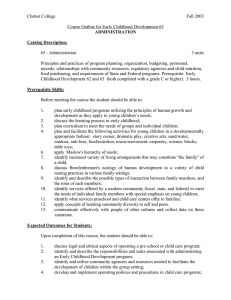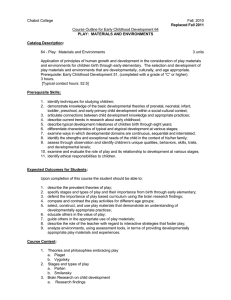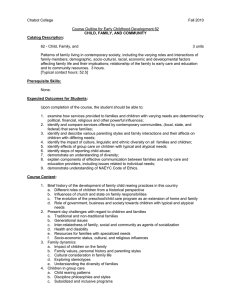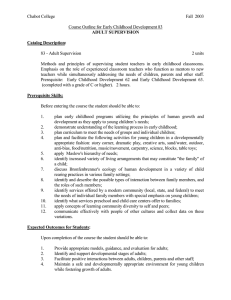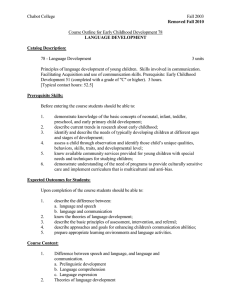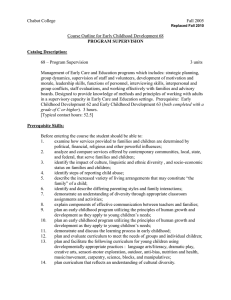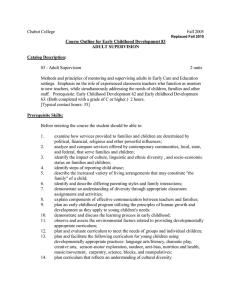Chabot College Fall 2005 Course Outline for Early Childhood Development 65
advertisement
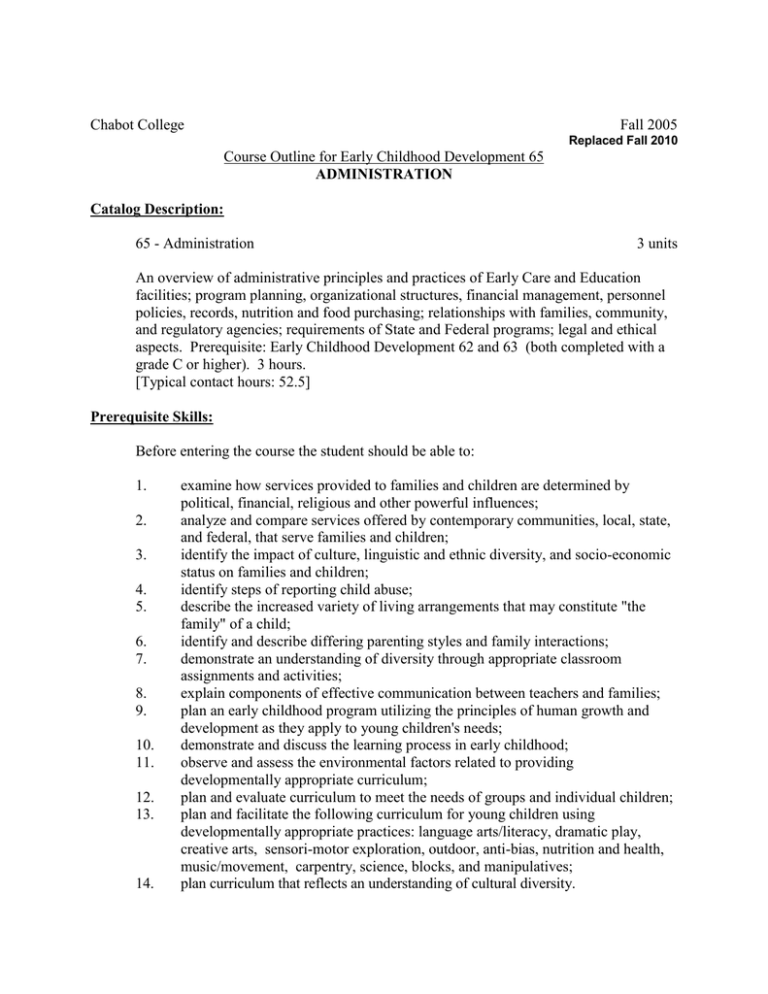
Chabot College Fall 2005 Replaced Fall 2010 Course Outline for Early Childhood Development 65 ADMINISTRATION Catalog Description: 65 - Administration 3 units An overview of administrative principles and practices of Early Care and Education facilities; program planning, organizational structures, financial management, personnel policies, records, nutrition and food purchasing; relationships with families, community, and regulatory agencies; requirements of State and Federal programs; legal and ethical aspects. Prerequisite: Early Childhood Development 62 and 63 (both completed with a grade C or higher). 3 hours. [Typical contact hours: 52.5] Prerequisite Skills: Before entering the course the student should be able to: 1. 2. 3. 4. 5. 6. 7. 8. 9. 10. 11. 12. 13. 14. examine how services provided to families and children are determined by political, financial, religious and other powerful influences; analyze and compare services offered by contemporary communities, local, state, and federal, that serve families and children; identify the impact of culture, linguistic and ethnic diversity, and socio-economic status on families and children; identify steps of reporting child abuse; describe the increased variety of living arrangements that may constitute "the family" of a child; identify and describe differing parenting styles and family interactions; demonstrate an understanding of diversity through appropriate classroom assignments and activities; explain components of effective communication between teachers and families; plan an early childhood program utilizing the principles of human growth and development as they apply to young children's needs; demonstrate and discuss the learning process in early childhood; observe and assess the environmental factors related to providing developmentally appropriate curriculum; plan and evaluate curriculum to meet the needs of groups and individual children; plan and facilitate the following curriculum for young children using developmentally appropriate practices: language arts/literacy, dramatic play, creative arts, sensori-motor exploration, outdoor, anti-bias, nutrition and health, music/movement, carpentry, science, blocks, and manipulatives; plan curriculum that reflects an understanding of cultural diversity. Chabot College Course Outline for Early Childhood Development 65 Fall 2005 Page 2 Expected Outcomes for Students: Upon completion of this course, the student should be able to: 1. 2. 3. 4. 5. discuss legal and ethical aspects of operating a pre-school or child care program; identify and describe the responsibilities and tasks associated with administrating an Early Childhood Development program; identify and utilize community agencies and resources needed to facilitate the development of children within the group setting; develop and implement operating policies and procedures in child care programs; develop and implement an appropriate nutritional program for the children served and provide documentation to satisfy the regulations of monitoring agencies. Course Content: 1. 2. 3. Early Care and Education facilities a. Philosophy and programs b. Profit/not for profit 1) Center based 2) Family child care 3) Faith based 4) State and Federal programs Personnel policies and practices a. Recruitment b. Diversity and discrimination c. Staff qualifications and job descriptions d. References e. Compensation and retention f. Orientation g. Supervision h. Review, evaluations and promotion i. Communication, conflict resolution, and grievances j. Staff meetings and in service training Facility development a. Needs and assessment of community b. Location and zoning c. Contractors and negotiating contracts d. Design/layout e. Marketing the program Chabot College Course Outline for Early Childhood Development 65 Fall 2005 Course Content (Cont’d): 4. 5. 6. 7. 8. 9. Administrative principles and practices a. Business plan b. Organizational structure c. Program planning d. Roles and styles Operational policies and procedures a. Start up and operating budget 1) income 2) personnel costs 3) purchasing 4) maintenance 5) future planning b. State and federal programs c. Nutrition and food service d. Records and data collection Legal and ethical aspects a. Licensing regulations b. Labor laws c. Americans with Disabilities Act d. Ethical dilemmas State and national accreditation a. Quality assessment tools b. Self study c. Program evaluation Building relationships and partnerships with families a. Enrollment b. Contracts c. Cultural responsiveness d. Resources e. Family meetings and conferences Community and regulatory agencies Methods of Presentation: 1. Lecture and discussion 2. Class reports 3. Audio-visual aids Page 3 Chabot College Course Outline for Early Childhood Development Fall 2005 Page 4 Assignments and Methods of Evaluating Student Progress: 1. Typical Assignments a. Research topic on management styles and write a three to five page paper b. Interview a director using specific questions related to administrative practices c. Reply to written ethical dilemmas using the NAEYC professional code of ethics d. Conduct an observation of a children’s program using an evaluation tool 2. Methods of Evaluating Student Progress a. Assignments b. Midterm project c. Final project/exam Textbook(s) (typical): Management of Child Development Centers, Patricia Hearron, Verna Hildebrand, Merrill Prentice-Hall, 2003, or latest edition Early Childhood Environmental Rating Scale, Clifford Harms, Teachers College Press, 2000, or latest edition Special Student Materials: None. tf: ECD 65 Revised: 10-11-04
